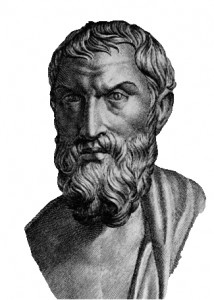Peace And Safety For Your Twentieth of December!!! – How Do You Choose Your Food?

Peace and Safety to the Epicureans of today, no matter where you might be!
Recent events in Connecticut remind us that death at an untimely young age is especially tragic. But it is important for us to consider also whether there is any age at which death is not tragic.
When we reflect on life and death we grapple with some of Epicurus’ most important insights. Anyone who knows much at all about Epicurus knows the phrase “death is nothing to us,” which means primarily that death brings our consciousness to an end with no experience of punishment or reward thereafter. But what is much less well understood is that Epicurus had much to say about our proper attitude toward length of life.
In Doctrines 18 through 20, Epicurus teaches that we need not lament the fact that we do not live forever. Our untrained minds tempt us all toward that view, but this is error which can be corrected through the study of Nature:
18. Bodily pleasure does not increase when the pain of want has been removed; after that it only admits of variation. The limit of mental pleasure, however, is reached when we reflect on these bodily pleasures and their related emotions, which used to cause the mind the greatest alarms.
19. Unlimited time and limited time afford an equal amount of pleasure, if we measure the limits of that pleasure by reason.
20. The flesh receives as unlimited the limits of pleasure; and to provide it requires unlimited time. But the mind, intellectually grasping what the end and limit of the flesh is, and banishing the terrors of the future, procures a complete and perfect life, and we have no longer any need of unlimited time. Nevertheless the mind does not shun pleasure, and even when circumstances make death imminent, the mind does not lack enjoyment of the best life.
These may be some of Epicurus’ most difficult doctrines to grasp, but tragic events such as the recent school shootings in Connecticut remind us that nothing is more critical than that we come to terms with our mortality. As Epicurus states in Doctrine 20, our “fleshly” impulses motivate us to grasp as long a life as possible, but our minds can be educated to understand that this is not the best course. As he explained in his letter to Menoeceus:
Accustom yourself to believing that death is nothing to us, for good and evil imply the capacity for sensation, and death is the privation of all sentience; therefore a correct understanding that death is nothing to us makes the mortality of life enjoyable, not by adding to life a limitless time, but by taking away the yearning after immortality. For life has no terrors for him who has thoroughly understood that there are no terrors for him in ceasing to live. Foolish, therefore, is the man who says that he fears death, not because it will pain when it comes, but because it pains in the prospect. Whatever causes no annoyance when it is present, causes only a groundless pain in the expectation. Death, therefore, the most awful of evils, is nothing to us, seeing that, when we are, death is not come, and, when death is come, we are not. It is nothing, then, either to the living or to the dead, for with the living it is not and the dead exist no longer.
But in the world, at one time men shun death as the greatest of all evils, and at another time choose it as a respite from the evils in life. The wise man does not deprecate life nor does he fear the cessation of life. The thought of life is no offense to him, nor is the cessation of life regarded as an evil. And even as men choose of food not merely and simply the larger portion, but the more pleasant, so the wise seek to enjoy the time which is most pleasant and not merely that which is longest. And he who admonishes the young to live well and the old to make a good end speaks foolishly, not merely because of the desirability of life, but because the same exercise at once teaches to live well and to die well. Much worse is he who says that it were good not to be born, but when once one is born to pass quickly through the gates of Hades. For if he truly believes this, why does he not depart from life? It would be easy for him to do so once he were firmly convinced. If he speaks only in jest, his words are foolishness as those who hear him do not believe.
Students of Epicurus often focus their attention on such issues as living simply and living apart from the crowd. Important as these are, we should not let them distract us from devoting the study that is needed to comprehend the ever-present reality of death. Throughout history it seems that men have been plagued most by the error of false religious teaching on the nature of gods, but the error of false opinion on length of life issues has caused almost as much trouble, and it may be that in our current world (at least in more “enlightened” areas) Epicurus’ insights on this subject are needed more than any other.
Remember:
And even as men choose of food not merely and simply the larger portion, but the more pleasant, so the wise seek to enjoy the time which is most pleasant and not merely that which is longest.
MEDITATE MORTEM!
________________
As Seneca recorded: Sic fac omnia tamquam spectet Epicurus! So do all things as though watching were Epicurus!
And as Philodemus wrote: “I will be faithful to Epicurus, according to whom it has been my choice to live.“

